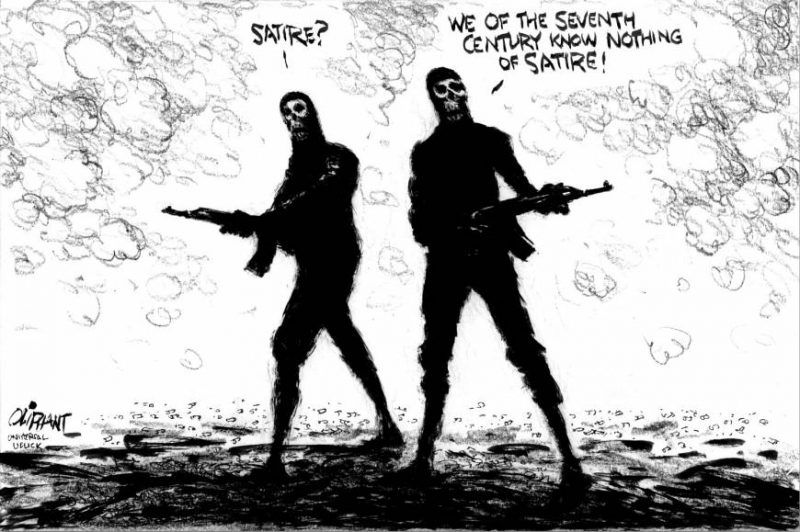
The horrific and barbaric massacre of journalists and cartoonists at Charlie Hebdo in Paris on Jan. 7 underlines the fact that press freedom can never be taken for granted. It needs to be protected and cherished by all freedom-loving people.
In the centuries leading up to the French revolution of 1789, France suffered, as did so much of Europe, from religious wars and persecution. The revolution with its slogan calling for “liberty, equality and fraternity” was firmly secular and anti-clerical. Theocracy based on religion is inherently intolerant and anti-democratic. Only in a state governed on secular principles upholding the principle of religious tolerance can there be real freedom to choose your religion or to have no religion.
Religious believers may be offended by cartoons lampooning the Prophet Muhammad or mocking the hypocrisy of Christians and other religious people. We may think that such cartoons and articles are in poor taste and would not pen them ourselves, but democratic freedoms will be undermined if we allow fears of violence to force or persuade journalists or cartoonists to refrain from publishing satirical drawings or writings.
Satire is an essential element in the best cartoons and can be both funny and effective in drawing attention to the absurdities of people who cannot laugh at themselves or are too stupid to see the evil in their extremist beliefs.
Satire may also be interpreted by some as infringing laws against incitement to violence or of hate or racialist behavior. A fine line has to be drawn to ensure that such laws are not used to censor or prevent the publication of satirical cartoons.
Threats against journalists must in the future be treated more seriously by the authorities and appropriate protection must be given to them. If law enforcement’s response is feeble, there is a danger that press freedom will be undermined by self-censorship.
The leaders of democratic countries and of the predominantly moderate Islamic communities in Europe have condemned the Paris massacres as an act of barbarism and only a few have suggested that it was a response to “blasphemous” provocation.
The Paris tragedy has rightly drawn attention to the wider threats to press freedom. The media in countries such as North Korea, China, Iran and Saudi Arabia are not free. In Russia, the situation may not be as bad as it was in the Soviet Union but opposition journalists know that unless they exercise careful self censorship they will find themselves in trouble. In Turkey, President Recep Tayyip Erdogan has been threatening free reporting especially of anything about corruption in his government.
Even in democratic countries there are potential threats to press freedom as a result of attempts to tighten and enforce laws on official secrets and privacy. Laws against libel in some countries can also be manipulated to curb criticism. Democratically elected parliaments need to watch carefully and question the executive over these issues.
The Japanese Constitution (Article 21) declares that “Freedom of assembly and association as well as speech, press and all other forms of expression are guaranteed.” Since the peace treaty came into force in 1952 this provision has by and large been upheld.
Recent Japanese history should not be forgotten. One of the greatest scholars of Japan in the Meiji Era who became emeritus professor of Japanese and Philology at Tokyo Imperial University was Basil Hall Chamberlain.
One of his most famous and widely circulated books was a compendium titled “Things Japanese.” There were six different editions of this book published between 1890 and 1939. The sixth and last edition contained an article on “Bushido or the Invention of a New Religion.” The prewar Japanese authorities who supported State Shinto and the military ethos of the time excised this article from all copies sold in Japan.
Such ultra-sensitivity seems unlikely to be repeated today, but complacency about the sanctity of press freedom in Japan would be unwise.
The new Japanese secrecy law may in practice only be used to preserve the secrecy of matters such as government cryptography and defense technology, which are also protected in other democratic countries, but the history of the implementation of laws on military secrecy in prewar Japan suggest that the present law, which was rushed through without sufficient parliamentary scrutiny, could be misused.
Japanese journalists who have attempted to demonstrate the truth about the way in which Japanese forces misused “sex slaves” in occupied countries have been subjected to attacks and threats from Japanese right-wing extremists. Similar threats have been made against publishers reluctant to water down their historical textbooks for schools under pressure from ignorant or wrongheaded historical revisionists.
The extreme right in Japan as well as the yakuza pose a potential threat to Japanese democratic institutions. Their influence has had its ups and downs over the last 70 years. It seems to an outside observer that it is growing again. One danger from this is that it will induce increased self-censorship.
Prime Minister Shinzo Abe is reported to have demanded that the media treat his government “fairly.” Most democratic governments try to achieve this by carefully presenting policies that will appeal to the electorate. They don’t usually demand fairness in a way that suggests their critics may suffer consequences.
The Japanese government’s attempts (or success?) in turning NHK, which should present news objectively, into a mouthpiece for Japanese policy leave the impression that Abe’s government would like to turn the Japanese media into a pussycat without claws.
Satire is an important element in Japanese humor. The French artist Georges Bigot who worked in Meiji Japan drew biting caricatures of Japanese and foreigners alike. He was following a long line of Japanese artists, including the great Hokusai whose manga promoted the genre. I hope that Japanese cartoonists will continue, as we say, “to take the mickey” out of their leaders — as I trust ours will also continue to do — by exposing the pomposity, hypocrisy and inadequacies of our politicians.
Hugh Cortazzi served as Britain’s ambassador to Japan from 1980-1984.
